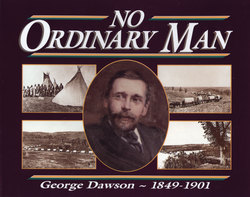Читать книгу No Ordinary Man - Lois Winslow-Spragge - Страница 8
На сайте Литреса книга снята с продажи.
ОглавлениеTHE “LITTLE DOCTOR,” GEORGE MERCER DAWSON
Even as a little girl I had a great fondness for my uncle. I sensed at an early age that he was not quite the same as other men since he was so small in stature and had a strange hump on his back. He was always very kind and generous and had such a humorous twinkle in his keen blue eyes. We as a family looked forward greatly to his infrequent visits. Now after all these years, I can still see him sitting in my father’s1 library smoking cigarettes while talking and laughing with the other men of the family in an atmosphere of geniality.
Presently, I have been trying to do justice to his memory by reconstructing his life from his personal letters, reports and other papers. It has been an inspiring and worthwhile experience to reflect on the achievements of this seemingly frail man who, though physically handicapped, was able to brave the elements and accomplish so much before his death at the age of fifty-two. Through the years he gave freely of his zeal, energy, and mental faculties and performed work of utmost importance and usefulness in the development of Canada.
This biography has not been written primarily from a scientific point of view, but rather with the idea of preserving the nature of this early Canadian; a man of strong courage who worked for the advancement of his country rather than consider his personal convenience and comfort. I feel that all who take time to read these pages will be fascinated by the undertakings of this memorable man.
Those living today might find some interest in reflecting briefly on the era when no whites lived on this North American continent. When this vast country was free and uncontrolled, rivers plotted their courses undisturbed, and mountains and valleys held their great mineral secrets. When thousands of buffalo roamed the grassy plains, and other animals both big and small climbed on the mountain slopes and lived secluded in the rich forests, and game and fish were in abundance everywhere. Indians at that time were the only human inhabitants and were masters of this paradise. They paddled the lakes and streams fearlessly in bark and wooden canoes, and hunted their food skilfully with bow and arrow.
How lovely this land must have been so spread out and undisturbed – a whole continent entirely unmolested and protected on all sides by vast blue oceans! It is difficult to contemplate such a time, and it is rather sad that this enchanted age had to come to an end. But, it was so, for men from far off lands, in their spirit of adventure and desire for fame, were pressing forward and creating new changes in the world. Thus, in 1492 Columbus came to these peaceful shores, and from that time on this huge continent underwent a new birth, such as no one then could have foreseen. Explorers from many lands sailed to North America’s shores seeking wealth and glory for themselves and their homelands. These intrepid spirits braved many dangers to achieve their desires, and eventually gained an extensive knowledge of the coastal shores and navigated some of the larger rivers. Thoughout this period of several hundred years, the Dutch, Spanish, French and British all vied for control of this vast and rich new world. Their various wishes to dominate caused many disturbances and grave fights. In 1776, finally, these struggles resulted in North America being divided into two great parts: the United States of America and what would later become Canada.
During these many years, the face of the land had been changed as white settlers arrived, and towns and villages sprung up. The Indians were gradually forced back, and it was necessary to buy large tracts of land from them for these immigrants. The first of the early explorers who came in sailing ships had long since passed away. Their places were taken by others who accomplished great jeats travelling over the continent into unknown tracts of land. Then, with white settlement advancing, there came the first geologists, mapmakers, missionaries, prospectors, surveyors, and transportation engineers. Few North Americans today, living in comfort and even luxury, realize how much we are indebted to these early men who tirelessly tramped the countryside, blazed trails in the forests, and paddled rivers and lakes, making observations and geological notes as to where minerals were to be found, railways could be run, and crops could be grown. It would be well to pause in our hurried lives and pay tribute to these pioneers who accomplished these well-nigh impossible feats and who, through their efforts, have made possible our present way of life.
My uncle, George Mercer Dawson, was one of these pioneer explorers who loved everything related to nature’s secrets. His life of adventure and unceasing work revealed here, display his keen search for knowledge, a search that still continues in the lives of others, and will do so as long as man strives for knowledge.
Lois Winslow-Spragge
1Bernard James Harrington (1848-1907), who married Anna Dawson in 1876, was bom at St. Andrews, Lower Canada, and educated at McGill and Yale. Harrington was appointed lecturer in mining and chemistry at McGill in 1871 and was on staff there for thirty-six years. From 1872 to 1879 he also served with the Geological Survey of Canada.
